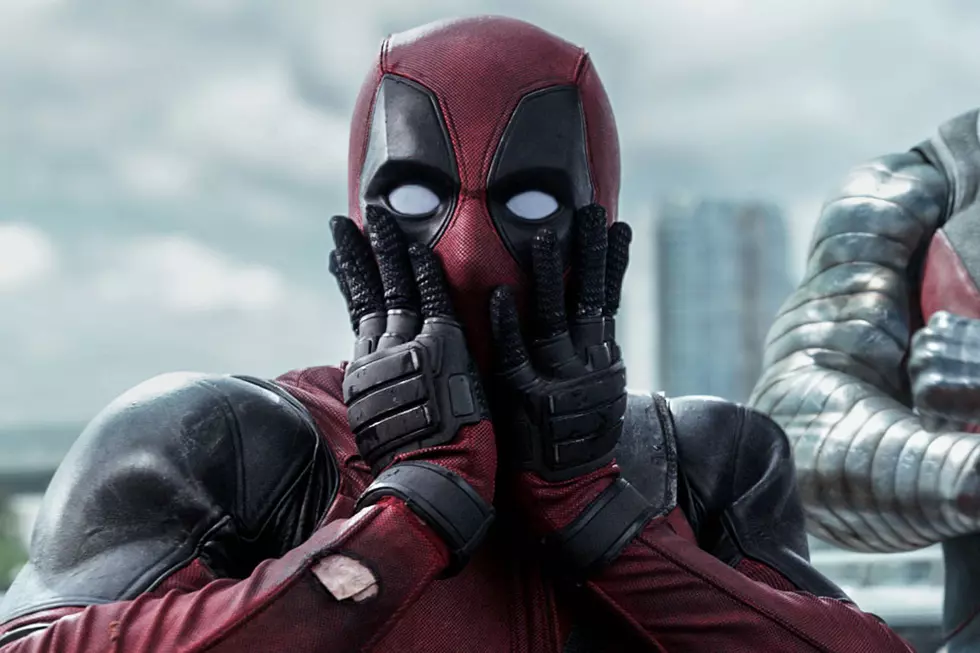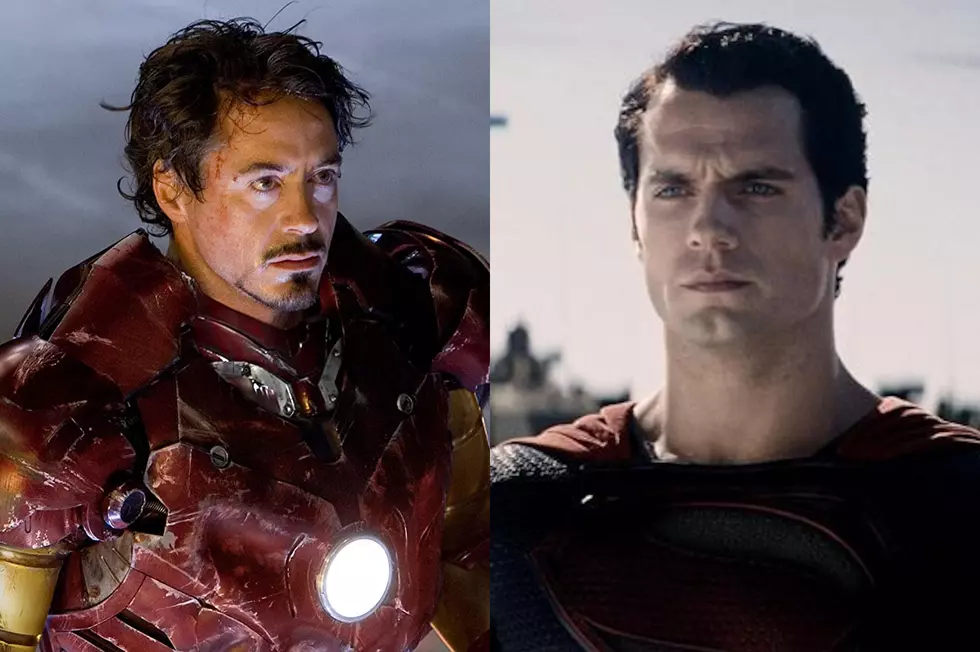![Iron Man 3: Rebecca Hall Talks Maya Hansen, Extremis And Writing Real Women [Interview]](http://townsquare.media/site/622/files/2013/04/untitled-1-1366922845.jpg?w=980&q=75)
Iron Man 3: Rebecca Hall Talks Maya Hansen, Extremis And Writing Real Women [Interview]

The brilliant scientist Maya Hansen was first introduced in 2005, in the pages of Iron Man: Extremis by Warren Ellis and Adi Granov. In that landmark story, Hansen co-created the titular biotechnology that could change humanity forever, granting its users accelerated healing, enhanced speed and intelligence, and impossible strength. Obviously such a revolutionary invention could be weaponized to devastating effect, and indeed it was, creating villains who breathed fire, shot energy out of their bare hands, and made big trouble for Tony Stark.
Unfortunately, Hansen's ambitions hastened the violent perversion of Extremis, and that tracks fairly closely with the plot of Iron Man 3, which stars Rebecca Hall as the troubled scientist. We had a chance to speak with Hall about her character's motivations and questionable actions in the new Marvel Studios film, which the actress praises highly for its adult depiction of strong and smart women who're defined by their abilities rather than their romantic relationships with its male hero.
SPOILER WARNING: The following contains some spoilers for Iron Man 3.

ComicsAlliance: Obviously a lot of Iron Man 3 is taken from Iron Man: Extremis by Warren Ellis and Adi Granov. Did you read that or any other comics in preparation for the role of Maya Hanson?
Rebecca Hall: I did. I thought it would be really arrogant of me not to have a look at where she came from and what the root of it all was. Not to mention the fact that I would be at a disadvantage considering billions of people know all about her and I would just sort of be winging it. So I did [read them] and enjoyed them. But frankly, they have little relevance to the script [of Iron Man 3]. So I had to be respectful and pay lip service to doing my background work, but then let it go.
CA: How would you characterize your character's function in this story?
RH: Frankly she's the driving force of the entire narrative, if I'm going to be honest with you. [laughs] She's not in a great deal of it, but she happens to have invented some technology that's going to radically alter the destiny of mankind and is going to entirely drive the narrative and shape the future and present -- and past, for that matter -- of Tony Stark.
CA: Maya seems quite altruistic in the start. Do you think she goes wrong?
RH: I don't think she stops being altruistic. She stumbles upon a scientific discovery and she's not going to walk away from it. She's on the side of innovation and the advancement of humanity. She's not getting involved in the ethical dilemma of what might be should it get into the wrong hands. She's acting practically. She has to carry on her work. She has to find a way of funding it so she can iron-out the glitches and it can be the best possible outcome, so she sells it. Then she's effectively working for someone else, and that's not really her fault that he might have questionable morals.

CA: She comes up with this incredible scientific discovery, but we learn later that Tony had contributed something to it. How much did he really contribute because --
RH: Nothing at all. He comes up with maybe an idea that might sort out the glitch, and she thinks that he might have it and so is determined to recruit him, basically, because she wants to get it right because it really goes tits-up, to use an English expression. Not that it isn't going tits-up already. That's the long and the short of it. Whether or not he has actually solved it, who knows?
CA: It seemed like he was getting credit for something he may not have --
RH: No, he's not. I think that's something that's perhaps a little unclear in the film, but no. From where I was standing, she's come up with [Extremis]. Otherwise what is she doing in the film?
CA: Is she saying to Tony, "What is this thing you wrote down? Can you explain it, just in case?"
RH: Yes, just in case it might be [the answer]. The one thing that both of them can take away from the time they met in Bern is the fact that they had a meeting of minds, whatever else was going on there as well. Odds are that he might be the one person in the whole world who worked out what she can't.
CA: With Killian [Guy Pearce], does Maya just think of him as an investor? It's purely about the money, she doesn't understand what he's up to?
RH: I don't think so, no. He's a sort of slightly weird stalker-ish figure who tracks her down and says, "I've got lots of money and I think you're brilliant and I'll support and fund your work." Who wouldn't [accept his offer]?
CA: It seemed like Tony really got to her, though. He said, "My girlfriend has a soul," the implication being Maya doesn't.
RH: Well, the implication being that she's sold her soul. But she thinks she's selling it for the greater good. She thinks she's in control of it. Like the Wernher von Braun thing she talks about. It's a very complicated thing.
CA: Pepper has a similar moment, where Killian brings her that opportunity and she assesses it and says, "Yeah, but look at these weaponized possibilities. I'm going to have to say no." Your character takes a different path.
RH: She takes it, yeah.
CA: You and Pepper share a track of the film just together that was interesting because it wasn't a jealous, "We've both been with the same man" kind of thing. It was all business.
RH: To be honest with you, it's one of the main reasons why I took the job. When I initially heard about it, I thought, okay they're bringing another woman in, it's going to be two females in this, it's going to probably end up in this horribly reductive, stereotypical cat fight. When I saw that it wasn't and that it was actually daring to write something that was grown up and sophisticated, where women are actually bigger than being defined by the people that they've slept with, I thought it was kind of great! I applauded it and I applaud Marvel for keeping it in because it would very easy for them to have gone, "Well, no one's interested in that sort of stuff in a film like this." But the truth is, actually, that they are because I have yet to do an interview with someone who hasn't said exactly that.
CA: Have you heard of the Bechdel Test before?
RH: No, what's that?
CA: It's by a cartoonist called Alison Bechdel. The test for a movie is, is there more one woman in the film? Do they talk to each other about something other than a man? And most movies will fail it.
RH: I'm sure! That's brilliant! I've never heard of that. That is brilliant.
CA: They're talking to each other about technology. The guy they slept with is almost incidental to the whole thing.
RH: Exactly. They're smart women. That's what people want to see now, that's the stuff that women are complaining about when they say, "Nobody writes good female characters." Sure, you can get big characters in movies that are women, but nobody's writing them particularly interestingly or making it real. It's that sort of stuff. [Iron Man 3 is] taking a different take, not the obvious one. That's great.
CA: This doesn't apply to your character, but to speak to the gender angle, it was so great that in the film, Pepper saved Tony.
RH: Absolutely. I thought so too.
CA: And in a particularly badass superhero kind of way.
RH: Well of course. That would be necessary, wouldn't it? It's great, I love that.
CA: What's your favorite bit of the film?
RH: I kind of like the flashback sequence in the beginning, which is one of my bits, but I did enjoy it. It was funny. All the bits with [Jon] Favreau. All the Downton Abbey.
CA: Was he meant to look like John Travolta in Pulp Fiction?
RH: He was maybe a little bit modeled, yeah.
CA: That was unexpected, the film opening with that old techno-pop song.
RH: I know! I loved all that. It was such a great throwback And I really enjoyed the fact that we could see a bit of the old Tony Stark again. That stuff is fun, when he's a playboy and behaving badly. We thought that we weren't allowed to see any more of that so it was quite exciting to dip back into that stuff again.
CA: It's like in comic books, where there's this idea of rebooting because you want to see the classic version of the character again.
RH: Yeah, you want to see the invention myth or whatever it's called?
CA: Origin story?
RH: That's the phrase I'm looking for, that's the jargon. Although they're always good, the origin stories. I get why people do it.
CA: It's also kind of alarming that we're at a stage where 1999 is a flashback, a distinct period in history that we can lampoon.
RH: It's scary, isn't it? Feels like a while ago.
CA: What's are you up to next?
RH: Well I went straight from this into shooting a tiny little independent French film directed by Patrice Leconte. It's a period film and beautiful. It was definitely a culture shock to go from [Iron Man 3 to that] but I wouldn't have it any other way, I think it's healthy for me. That will be coming out at the end of the year. Then I've got a legal thriller called Closed Circuit set in London about barristers and court cases that relate to terrorism. That will be coming out in August and it's really, really good actually, I love it. And I'm about to start shooting in maybe six days -- oh, my, six days -- my first day on a film called Transcendence which is directed by Wally Pfister.
CA: Oh, Christopher Nolan's director of photography?
RH: Yes. It's produced by Christopher Nolan and all that team. It stars Johnny Depp. It's really good, I'm really excited about it. It's a great script. I can't tell you anything about it!
CA: Would you do another superhero film?
RH: Sure! I had fun with it. I would definitely do it again.
Iron Man 3 opens May 3.
More From ComicsAlliance







![Jenny Sparks Enters The Scene In Ellis And Davis Hunt’s ‘The Wild Storm’ #3 [Preview]](http://townsquare.media/site/622/files/2017/03/TWS_Cv3_000.png?w=980&q=75)



